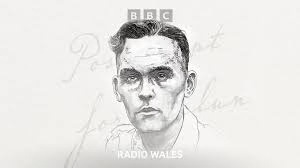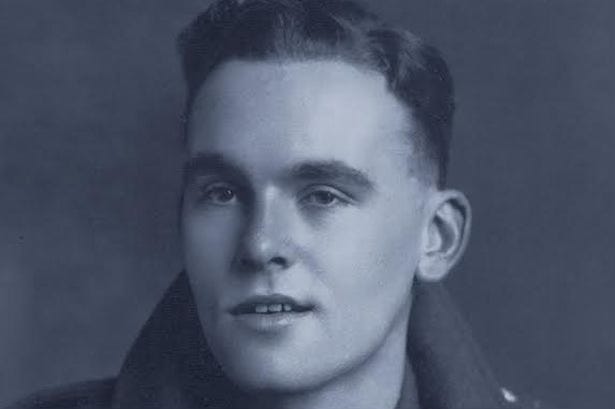What a wonderful thing to have a BBC podcast dedicated not just to Welsh writing, but specifically to one Welsh writer, long dead and half-forgotten. This is the sort of thing I bore people about at the BBC all the time as I wonder around the shiny colourful building like a ghost, slack-jawed, groaning “more arts… more arts”. Well, the very lovely people at the BBC have a lot on their plates, and yet here is proof that the stories of our literary culture are vast and rich and relevant and beautiful in their poignancy and vivaciousness. Postscript for Alun: The Legacy for Alun Lewis is a passionate and unapologetically literate exploration of the life and legacy of one of Wales’ most important and (for the lucky few who know his work) beloved poets.
Casi Wyn, songwriter, composer, performer, and former Bardd Plant Cymru, is a personable presenter, with more than a hint of a young Cerys Matthews in her delivery (although I think Matthews would have nailed the pronunciation of “Lewis”), she is a thoughtful voice to guide the listener along the journey of the poet’s tragic life. She speaks with important voices. There’s John Pikoulis, Lewis’s biographer (and former English professor at what is weirdly referred to several times in this podcast as “the university in Cardiff” rather than Cardiff University, which is the name of the place - anybody have any explanation as to why this might be, please leave a message below). Wyn also speaks to Gwyneth Lewis, former national poet of Wales who has also written famously on her relationship with manic depression, and it is this insight in Alun Lewis’ life and work that is just as important as her perspective on his verse.
Lewis’s death was officially recorded an accident, the coroner’s court ruling his gun had gone off when he fell near the latrine where he was stationed in Burma in 1944. However careful one tries to be in assigning suicide to the end of a life when no categorical proof is on offer, Lewis is now widely regarded to have shot himself that morning. He was a depressive, and his verse is obsessed with themes of mortality, futility, and loneliness and isolation. But still, there is no absolute proof he did not die by accident, and we must be wary of the very real need to appoint such a neat if dreadful ending to his story for the sake of a romantic perspective on the arc of a poet. He was just 28 when he died, and tragedy is a very alluring thing when wrapping up someone’s story.
But what really matters - and what should always matter, is the work. Alun Lewis’ poetry, once encountered, is not so easily forgotten, and Wyn’s podcast contains a great deal of it (particularly the verse recited by the wonderful Samantha Wynne Rhydderch).
Here’s the full text of the poem she reads on the podcast…
In Hospital: Poona
Last night I did not fight for sleep
But lay awake from midnight while the world
Turned its slow features to the moving deep
Of darkness, till I knew that you were furled,Beloved, in the same dark watch as I.
And sixty degrees of longitude beside
Vanished as though a swan in ecstasy
Had spanned the distance from your sleeping side.And like to swan or moon the whole of Wales
Glided within the parish of my care:
I saw the green tide leap on Cardigan,
Your red yacht riding like a legend there,
And the great mountains, Dafydd and Llewelyn,
Plynlimmon, Cader Idris and Eryri
Threshing the darkness back from head and fin,
And also the small nameless mining valleyWhose slopes are scratched with streets and sprawling graves
Dark in the lap of firwoods and great boulders
Where you lay waiting, listening to the waves-
My hot hands touched your white despondent shoulders– And then ten thousand miles of daylight grew
Between us, and I heard the wild daws crake
In India’s starving throat; whereat I knew
That Time upon the heart can break
But love survives the venom of the snake.
Along with a hundred+ other writers, I write about Alun Lewis in my new book. And here’s a bit of what I had to say of him there.
…a plaque to Alun Lewis is still displayed for casual perusal at the old grammar school in Cowbridge to which he won a scholarship already with ambitions to be a writer. The plaque is surprising, given the narrative of Lewis’s literary abandonment, and I remember the first time I saw it, not expecting it, as I was halfway through saying out loud, “I think this might the school that Alun Lewis went to.” Lewis the poet and Lewis the man has always, I would argue, found connections with those of a literary bent, for his poetry is dark and unflinching, obsessed with death, and his life was one equally unflinching in conviction, bravery, and tragedy. He was, it has to be said, the sort of figure a certain type of reader gravitates towards.
Romanticism has played a significant part in how we have canonised our writers of war material. Lewis’s poems and short stories fixated on fatalism, and the mystery surrounding his suicide in Burma in 1945 has fed into the minor mythologising of the man (although nothing on the scale of the demise of Dylan Thomas in a New York hotel room a decade or so later). But it is perhaps fitting that Lewis’ death had something of the literary tragedy to it, in line with that of his literary hero Edward Thomas, who also died so mysteriously at Arras in 1917 in the earlier world war. Lewis certainly deserves his plaque, and his work deserves to be anthologised and remembered as much as any number of more frequently observed names of his generation.
I’m glad the podcast exists (and even gladder that it is good), because the figure of Lewis should be one that exists fully for us to view, rather than as a writer who comes in and out of focus on occasion. Because of the nature of my book, my entry on him is relatively insubstantial even though it is passionate and heartfelt. But Pikoulsis’s biography is a very good one. This podcast is a very good one. And then, of course, most importantly, is Alun Lewis’s work.
Here is one of my favourites of his, written for the love of his life.
Postscript: For Gweno
If I should go away,
Beloved, do not say
'He has forgotten me'.
For you abide,
A singing rib within my dreaming side;
You always stay.
And in the mad tormented valley
Where blood and hunger rally
And Death the wild beast is uncaught, untamed,
Our soul withstands the terror
And has its quiet honour
Among the glittering stars your voices named.
You can buy the Collected Poems of Alun Lewis, published by Seren, here.
And the podcast is available here.
Gary Raymond is a novelist, author, playwright, critic, and broadcaster. In 2012, he co-founded Wales Arts Review, was its editor for ten years. His latest book, Abandon All Hope: A Personal Journey Through the History of Welsh Literature is available for pre-order and is out in May 2024 with Calon Books.






'The university in Cardiff'. For me, as an editor, had this been written it would have earned itself a query along the lines of 'Which one? There are two.' But as a previous member of staff at that establishment, I am also aware that for a certain class and age of professorial staff, there would only ever be one university in Cardiff, the other one being considered no better than an upstart polytechnic equivalent even though, I think, it never actually held that designation.